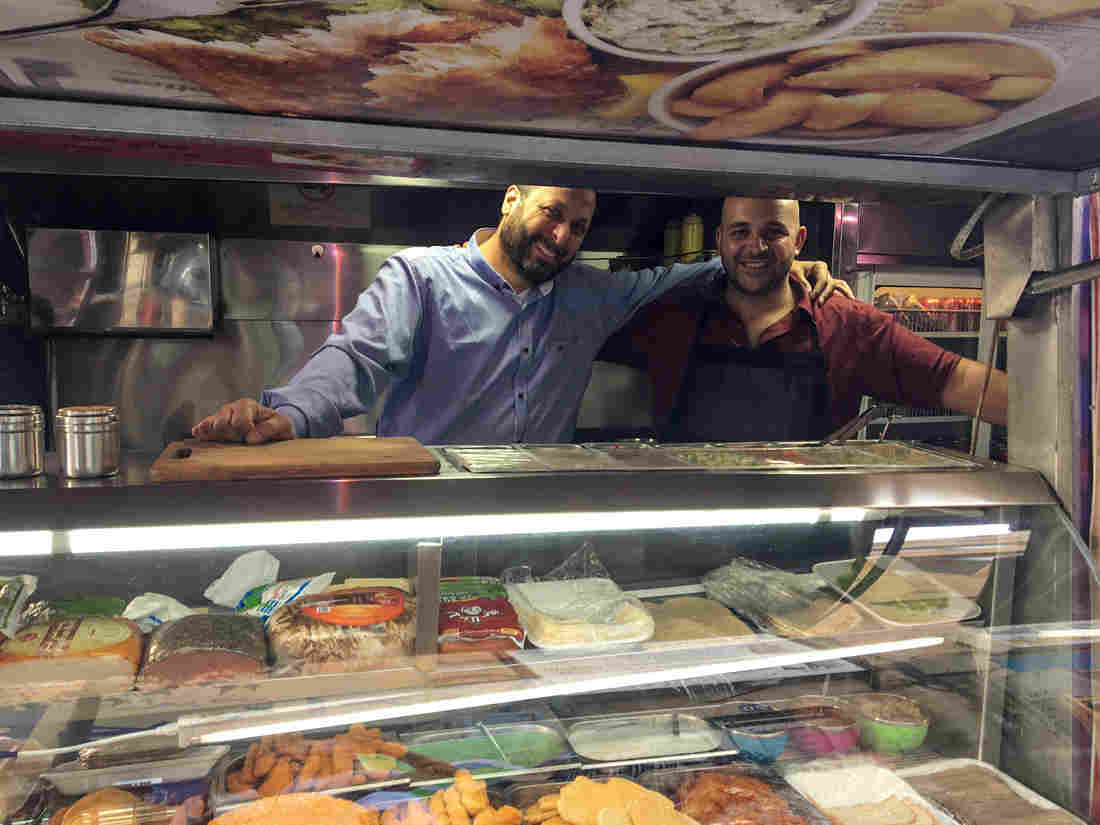In An Israeli Prison, 2 Palestinians Found A Future: A Food Truck

Khaldoun Barghouti (left) and Abdul Rahman Rahim al-Bibi (right), behind the counter at their food truck. The two men say they met behind bars in an Israeli prison, where they worked in the canteen. Lauren Frayer/NPR hide caption
toggle caption
Lauren Frayer/NPR
Huddled over a hot griddle in the back of his food truck, Abdel Rahman Rahim al-Bibi doesn’t hold back on the curry powder. He’s frying up shish taouk — a spicy chicken kebab dish popular in the Middle East.
Aromas waft down the block, and a line forms on the city sidewalk next to al-Bibi’s truck — office workers popping out for a quick bite, a mother and her two children, and a law student on his way home from the gym.
With food trucks all the rage, this could be any American city at lunchtime. But al-Bibi is frying up shish taouk in his hometown of Ramallah, in the Israeli-occupied West Bank.
Not only that. Al-Bibi and his business partner, Khaldoun Barghouti — a 43-year-old father of six — are both ex-cons. They met behind bars, they say — working together in an Israeli prison canteen.
“In prison, we didn’t get to eat much meat, and we never had enough spices,” al-Bibi, 35, recalls. “We used to dream about what we’d cook when we got out. We talked about it constantly. And now look at my truck!”
He points at ingredients in his refrigerated glass display case: Homemade hamburgers, schnitzel, chicken breast, chicken fingers, roast beef. And there’s more in the back fridge. Al-Bibi and Barghouti are unmistakably carnivores now. They tease each other about how much weight they’ve gained since getting out of jail.
Al-Bibi served nine years for shooting at Israeli forces, in an incident an Israeli military spokesperson said injured two soldiers. Barghouti served almost eight years on weapons charges. They’re among several hundred-thousand Palestinians in the West Bank and Gaza Strip who’ve spent time in Israeli jails.
For these two, it was time to think a great deal about food.
“We were cooking for all the prisoners — in all, about 1,000 men — breakfast, lunch and dinner,” Barghouti explains.
So they had to get creative: Scavenging stale rolls for breadcrumbs. Frying the few spices they had to stretch their flavor and smell. That’s what gave them the idea for this food truck, stocked with all the spices they’d dreamed of. They painted it with psychedelic rainbows, an Arabic sign that says “Food Train” — and a smiley face on front.
“They’re the colors of freedom,” Barghouti says. “In prison, it was all brown — our uniforms, the bland food, the open desert around us. I decided I never wanted to work indoors again.”
Barghouti punches keys on a control panel, to adjust four solar panels on the roof. They were designed and installed by an engineer the men did time with. They allow the truck to park and start cooking — no need to hook up to a diesel generator.
The West Bank has lots of fast-food joints and vegetable carts, but Barghouti says the Palestinian Authority had to create a new kind of license for this restaurant on wheels. The men took out a bank loan of nearly $40,000, to buy their truck and have it custom-outfitted with two refrigerators, a display case, deep fryer, grill and griddle.
Six months after their food truck’s debut, it’s doing swift business, and Barghouti says they’re ahead on their loan repayments. A dozen customers arrive in half an hour. Burgers cost about $2.
“My daughter came home from school gushing about how all the teenagers eat here,” says Faiza Bazar, who’s in line, with two hungry, giggling daughters in tow.
Bazar says she saw a program about al-Bibi and Barghouti on local TV, and wants to support them for political reasons, because they’re former prisoners.
The two men are familiar faces now, parked near offices of the Ramallah municipality in the mornings, and outside the local university when classes get out. Then they drive over to a nearby square, where they’ve been known to serve up hot sahab chicken sandwiches until 3 a.m.
They recently hired two more workers — both former prisoners, too. And Barghouti says they’re already dreaming of the next project: A double-decker tour bus, with a kitchen on the bottom floor, and a dining room up top.



